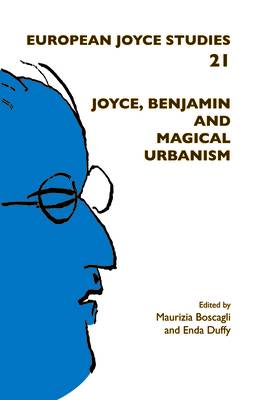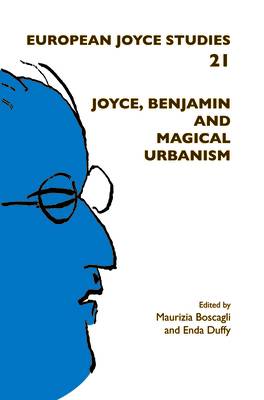
- Afhalen na 1 uur in een winkel met voorraad
- Gratis thuislevering in België vanaf € 30
- Ruim aanbod met 7 miljoen producten
- Afhalen na 1 uur in een winkel met voorraad
- Gratis thuislevering in België vanaf € 30
- Ruim aanbod met 7 miljoen producten
Zoeken
Joyce, Benjamin and Magical Urbanism
€ 123,95
+ 123 punten
Omschrijving
Joyce, Benjamin and Magical Urbanism offers for the first time a sustained exploration of parallels between the fiction of James Joyce and the cultural criticism of Walter Benjamin. Benjamin is perhaps modernism's most eloquent theorist, Joyce its finest writer of fiction; both haunted the same Paris streets at the height of the modernist moment, and both developed accounts of the flaneur's encounter with the city, with commodity culture and with others, that were revolutionary in their day and continue to set the agendas for culture and cultural critique. To place some of the work of each side by side is to make evident their affinities: the skills of each as new cartographers of the urban, the interest of each in ethnicity, nationalism, and exile, the way in which the 'Profane illumination' celebrated by Benjamin meets the 'Epiphany' of Joyce's A Portrait, as each rethought the epistemology of insight in the modernist moment. This collection explores these parallels between two of the greatest modernists, casting the aesthetic strategies of Joyce in the light of the aesthetic critique of Benjamin, opening up the politics of the one in the light of those of the other, and discerning the parallels between Joyce's version of a modern urban world in which self and society effect an uneasy rapprochement and Benjamin's modernist scenarios in which the aura might still linger. This collection discovers extraordinary parallels between the two writers who, writing in Paris, offered new accounts of urban selfhood and survival to the world.
Specificaties
Betrokkenen
- Uitgeverij:
Inhoud
- Aantal bladzijden:
- 256
- Taal:
- Engels
- Reeks:
- Reeksnummer:
- nr. 21
Eigenschappen
- Productcode (EAN):
- 9789042034259
- Verschijningsdatum:
- 1/01/2011
- Uitvoering:
- Paperback
- Formaat:
- Trade paperback (VS)
- Afmetingen:
- 150 mm x 220 mm
- Gewicht:
- 403 g

Alleen bij Standaard Boekhandel
+ 123 punten op je klantenkaart van Standaard Boekhandel
Beoordelingen
We publiceren alleen reviews die voldoen aan de voorwaarden voor reviews. Bekijk onze voorwaarden voor reviews.







